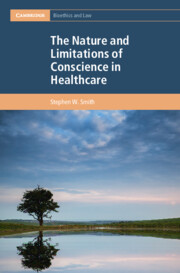Refine search
Actions for selected content:
2 results
5 - Conscientious Provision and Objection
-
- Book:
- The Nature and Limitations of Conscience in Healthcare
- Published online:
- 12 September 2025
- Print publication:
- 02 October 2025, pp 82-109
-
- Chapter
- Export citation

The Nature and Limitations of Conscience in Healthcare
-
- Published online:
- 12 September 2025
- Print publication:
- 02 October 2025
